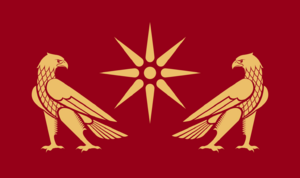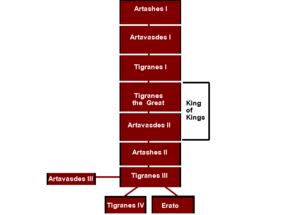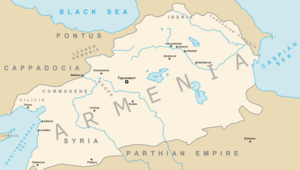Artaxiad dynasty facts for kids
Quick facts for kids Artaxiad dynasty |
|
|---|---|

Flag of the Artaxiad dynasty
|
|
| Parent house | Orontid dynasty |
| Country | Armenia Syria Cilicia Albania Iberia |
| Founded | 190 BC |
| Founder | Artaxias I |
| Current head | Extinct |
| Final ruler | Erato I |
| Titles |
|
| Dissolution | 12 AD |
The Artaxiad dynasty (also called Artashesian) was a powerful family that ruled the Kingdom of Armenia from 189 BC until 12 AD. This was when the Romans took over. Their kingdom included a large area called Greater Armenia, plus Sophene and sometimes parts of Mesopotamia.
The Artaxiads often fought against the Romans, the Seleucids, and the Parthians. Under King Tigranes the Great (who ruled from 95 to 55 BC), the Kingdom of Armenia grew to its largest size. For a short time, it stretched all the way from the Caspian Sea to the Mediterranean Sea.
Contents
How the Artaxiad Dynasty Started
Historians like Strabo say that Artaxias and Zariadres were governors, called satraps, for the Seleucid Empire. They ruled over different parts of Armenia. After the Seleucids lost a big battle in 190 BC, Artaxias and his family took their chance. They started a rebellion against the old ruling family, the Orontids.
Artaxias became the first king of the Artaxiad dynasty in Armenia in 188 BC. Experts believe that Artaxias and Zariadres were not outsiders. They were likely local leaders connected to the earlier Orontid family. Their names were Armenian, not Greek, which supports this idea.
King Artaxias Unites Armenian Lands
Artaxias is seen as one of the most important kings in Armenian history. He claimed to be related to the old Orontid kings, even if it's not fully clear if he was. When he started ruling, some areas with Armenian-speaking people were still controlled by other countries. Artaxias made it his main goal to bring all these lands together under his rule.
The Greek historian Strabo wrote about how Artaxias expanded his kingdom in all directions: west, east, north, and south. He took lands from the Medes, Iberians, Chalybians, and Syrians. This helped unite many Armenian-speaking people.
Artaxias also founded the new Armenian capital city, Artaxata. He got help from the famous Carthaginian general Hannibal, who was hiding from the Romans in Artaxias's court. The people from the old capital, Ervandashat, were moved to Artaxata.
More than a dozen stone boundary markers from Artaxias's time have been found in modern Armenia. These stones have Aramaic writing on them. They show that Artaxias claimed to be a descendant of the Orontid dynasty. He called himself "King Artaxias, the son of Orontid Zariadres."
Greek Influences on Armenia
Even though Alexander the Great didn't conquer Armenia directly, Greek culture started to influence the country. This began under the Orontid kings and became very strong under the Artaxiads, especially King Tigranes the Great. Armenian rulers started to use many Greek ideas.
For example, Armenian coins, which first appeared under the Orontids, followed Greek styles. They even had Greek writing on them. Some coins called Armenian kings "Philhellenes," which means "lovers of Greek culture." We know Greek was spoken in Armenia because of old parchments and rock carvings.
Cleopatra, the wife of Tigranes the Great, invited Greek speakers like writers and historians to the Armenian court. When the Roman general Lucullus captured the Armenian capital, he found Greek actors there. They were ready to perform plays for Tigranes. Tigranes's son, Artavasdes II, even wrote Greek plays himself! However, Armenian culture still kept many strong Iranian traditions, especially in religion.
Art and Buildings
King Artaxias built special boundary stones, called stelae, around Lake Sevan. These stones were like older Persian designs. They marked the borders of land ownership. The stones had Aramaic writing that showed Artaxias's royal power. They also hinted at his connection to older Persian kings.
Religion in Artaxiad Armenia
Historians say that even though the Artaxiad kings liked Greek culture, their religious beliefs stayed the same. They were strongly Zoroastrian. This was an ancient Persian religion. However, Greek gods and goddesses also became popular among the richer people in Armenia during the later Artaxiad period.
The Armenian Empire at its Peak
During the rule of Tigranes the Great (95–55 BC), the Kingdom of Armenia was at its strongest. For a short time, it became the most powerful country east of the Roman lands. Artaxias and the earlier kings had built a strong base for Tigranes.
Armenia was a mountainous country, and local leaders called nakharars had a lot of power. Tigranes brought them together to make the kingdom safer and more united. The borders of Armenia stretched from the Caspian Sea to the Mediterranean Sea. The Armenian Empire became so large that the Romans and Parthians actually teamed up to fight against them.
Tigranes also built a new capital city, Tigranocerta, which was more central to his large empire. He took many lands from the Parthians, forcing them to sign a peace treaty. Neighboring kingdoms like Iberia, Albania, and Atropatene lost land and became states that had to obey Tigranes. In 83 BC, the Greeks in the Seleucid Empire even offered Tigranes their crown. This made the Armenian Empire reach as far south as modern Acre, Israel, leading to conflicts with the Hasmoneans.
The Decline of the Artaxiad Dynasty
The Romans becoming more involved in Asia Minor led to the end of Tigranes's empire. Tigranes had become friends with Mithridates the Great, a big enemy of Rome. During the Third Mithridatic War, in 69 BC, a Roman army led by Lucullus invaded Armenia. They defeated Tigranes outside Tigranocerta.
In 66 BC, another Roman general, Pompey, forced Tigranes to give up. Pompey made Armenia shrink back to its old borders. But he let Tigranes stay king as a friend of Rome. From then on, Armenia became a "buffer state," a country between the two powerful empires of Rome and Parthia.
Tigranes's son, Artavasdes II, kept the alliance with Rome. He gave good advice to the Roman general Marcus Licinius Crassus about fighting the Parthians. But Crassus didn't listen, and his army was badly defeated.
Later, when Mark Antony became ruler of Rome's eastern lands, he started to doubt Artavasdes's loyalty. Artavasdes had married his sister to the son of the Parthian king. In 35 BC, Antony invaded Armenia and took Artavasdes prisoner to Egypt. Artavasdes was later killed there. Antony then put his own six-year-old son, Alexander Helios, on the Armenian throne.
Artavasdes's son, Artaxias II, got help from the Parthians. He took back the throne and killed the Roman soldiers in Armenia. But after ten years, he was murdered. The kingdom then fell into a civil war, with some people supporting Rome and others supporting Parthia. Eventually, Armenia became a Roman protectorate, meaning Rome protected and controlled it. The Artaxiad dynasty ended in chaos. It took a long time before the Arsacid dynasty became the next clear rulers of Armenia.
Artaxiad Kings of Armenia
(Note: Some dates are approximate or doubtful).
- Artaxias I (190–159 BC)
- Tigranes I (159–123 BC)
- Artavasdes I (123–95 BC)
- Tigranes the Great (Tigranes II, 95–55 BC)
- Artavasdes II (55–34 BC)
- Artaxias II (33–20 BC)
- Tigranes III (20–10 BC)
- Tigranes IV with Erato (10–2 BC)
- Ariobarzanes (2 BC–4 AD)
- Artavasdes III (4–6 AD)
- Tigranes V then ruled with Erato (6–12 AD)
Genealogy of the Artaxiads
| Genealogy of the Artaxiads as proposed by Cyril Toumanoff. | |||||||||||||||||||||||||||||||||||||||||||||||||||||||||||||||||||||||||||||||||||||||||||||||||||||||||||||||||||||||||||||||||||||||||||||||||||||||||||||||||||||||||||||||||||||||||||||||||||||||||||||||||||||||||||||||||||||||||||||||||||||||||||||||||||||||||||||||||||||||||||||||||||||||||||||||||||||||||||||||||||||||||||||||||||||||||||||||||||||||||||||||||||||||||||||||||||||||||||||||||||||||||||||||||||||||||||||||||||||||||||||||||||||||||||||||||||||||||||||||||||||||||||||||||||||||||||||||||||||||||||||||||||||||||||||||||||||||||||||||||||||||||||||||||||||||||||||||||||||||||||||||||||||||||||||||||||||||||||||||||||||||||||||||||||||||||||||||||||||||||||||||||||||||||||||||||||||||||||||||||||||||||||||||||||||||||||||||||||||||||||||||||||||||||||||||||||||||||||||||||||||||||||||||||||||||||||||||||||||||||||||||||||||||||||||||||||||||||||||||||||||||||||||||||||||||||||||||||||||||||||||||||||||||||||||||||||||||||||||||||||||||||||||||||||||||||||||||||||||||
|---|---|---|---|---|---|---|---|---|---|---|---|---|---|---|---|---|---|---|---|---|---|---|---|---|---|---|---|---|---|---|---|---|---|---|---|---|---|---|---|---|---|---|---|---|---|---|---|---|---|---|---|---|---|---|---|---|---|---|---|---|---|---|---|---|---|---|---|---|---|---|---|---|---|---|---|---|---|---|---|---|---|---|---|---|---|---|---|---|---|---|---|---|---|---|---|---|---|---|---|---|---|---|---|---|---|---|---|---|---|---|---|---|---|---|---|---|---|---|---|---|---|---|---|---|---|---|---|---|---|---|---|---|---|---|---|---|---|---|---|---|---|---|---|---|---|---|---|---|---|---|---|---|---|---|---|---|---|---|---|---|---|---|---|---|---|---|---|---|---|---|---|---|---|---|---|---|---|---|---|---|---|---|---|---|---|---|---|---|---|---|---|---|---|---|---|---|---|---|---|---|---|---|---|---|---|---|---|---|---|---|---|---|---|---|---|---|---|---|---|---|---|---|---|---|---|---|---|---|---|---|---|---|---|---|---|---|---|---|---|---|---|---|---|---|---|---|---|---|---|---|---|---|---|---|---|---|---|---|---|---|---|---|---|---|---|---|---|---|---|---|---|---|---|---|---|---|---|---|---|---|---|---|---|---|---|---|---|---|---|---|---|---|---|---|---|---|---|---|---|---|---|---|---|---|---|---|---|---|---|---|---|---|---|---|---|---|---|---|---|---|---|---|---|---|---|---|---|---|---|---|---|---|---|---|---|---|---|---|---|---|---|---|---|---|---|---|---|---|---|---|---|---|---|---|---|---|---|---|---|---|---|---|---|---|---|---|---|---|---|---|---|---|---|---|---|---|---|---|---|---|---|---|---|---|---|---|---|---|---|---|---|---|---|---|---|---|---|---|---|---|---|---|---|---|---|---|---|---|---|---|---|---|---|---|---|---|---|---|---|---|---|---|---|---|---|---|---|---|---|---|---|---|---|---|---|---|---|---|---|---|---|---|---|---|---|---|---|---|---|---|---|---|---|---|---|---|---|---|---|---|---|---|---|---|---|---|---|---|---|---|---|---|---|---|---|---|---|---|---|---|---|---|---|---|---|---|---|---|---|---|---|---|---|---|---|---|---|---|---|---|---|---|---|---|---|---|---|---|---|---|---|---|---|---|---|---|---|---|---|---|---|---|---|---|---|---|---|---|---|---|---|---|---|---|---|---|---|---|---|---|---|---|---|---|---|---|---|---|---|---|---|---|---|---|---|---|---|---|---|---|---|---|---|---|---|---|---|---|---|---|---|---|---|---|---|---|---|---|---|---|---|---|---|---|---|---|---|---|---|---|---|---|---|---|---|---|---|---|---|---|---|---|---|---|---|---|---|---|---|---|---|---|---|---|---|---|---|---|---|---|---|---|---|---|---|---|---|---|---|---|---|---|---|---|---|---|---|---|---|---|---|---|---|---|---|---|---|---|---|---|---|---|---|---|---|---|---|---|---|---|---|---|---|---|---|---|---|---|---|---|---|---|---|---|---|---|---|---|---|---|---|---|---|---|---|---|---|---|---|---|---|---|---|---|---|---|---|---|---|---|---|---|---|---|---|---|---|---|---|---|---|---|---|---|---|---|---|---|---|---|---|---|---|---|---|---|---|---|---|---|---|---|---|---|---|---|---|---|---|---|---|---|---|---|---|---|---|---|---|---|---|---|---|---|---|---|---|---|---|---|---|---|---|---|---|---|---|---|---|---|---|---|---|---|---|---|---|---|---|---|---|---|---|---|---|---|---|---|---|---|---|---|---|---|---|---|---|---|---|---|---|---|---|---|---|---|---|---|---|---|---|---|---|---|---|---|---|---|---|---|---|---|---|---|---|---|---|---|---|---|---|---|---|---|---|---|---|---|---|---|---|---|---|---|---|---|---|---|---|---|---|---|---|---|---|---|---|---|---|---|---|---|---|---|---|---|---|---|---|---|---|---|---|---|---|---|---|---|---|---|---|---|---|---|---|---|---|---|---|---|---|---|---|---|---|---|---|---|---|---|---|---|---|---|---|---|---|---|---|---|---|---|---|---|---|---|---|---|---|---|---|---|---|---|---|---|---|---|---|---|---|---|---|---|---|---|---|---|---|---|---|---|---|---|---|---|---|---|---|---|---|---|---|---|---|---|---|---|---|---|---|---|---|---|---|---|---|---|---|---|---|---|---|---|---|---|---|---|---|---|---|---|---|---|---|---|---|---|---|---|---|---|---|---|---|---|---|---|---|
|
|||||||||||||||||||||||||||||||||||||||||||||||||||||||||||||||||||||||||||||||||||||||||||||||||||||||||||||||||||||||||||||||||||||||||||||||||||||||||||||||||||||||||||||||||||||||||||||||||||||||||||||||||||||||||||||||||||||||||||||||||||||||||||||||||||||||||||||||||||||||||||||||||||||||||||||||||||||||||||||||||||||||||||||||||||||||||||||||||||||||||||||||||||||||||||||||||||||||||||||||||||||||||||||||||||||||||||||||||||||||||||||||||||||||||||||||||||||||||||||||||||||||||||||||||||||||||||||||||||||||||||||||||||||||||||||||||||||||||||||||||||||||||||||||||||||||||||||||||||||||||||||||||||||||||||||||||||||||||||||||||||||||||||||||||||||||||||||||||||||||||||||||||||||||||||||||||||||||||||||||||||||||||||||||||||||||||||||||||||||||||||||||||||||||||||||||||||||||||||||||||||||||||||||||||||||||||||||||||||||||||||||||||||||||||||||||||||||||||||||||||||||||||||||||||||||||||||||||||||||||||||||||||||||||||||||||||||||||||||||||||||||||||||||||||||||||||||||||||||||||
See also
 | Jewel Prestage |
 | Ella Baker |
 | Fannie Lou Hamer |



